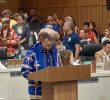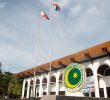(Compostela Information Officer) Obenieta could not take it that victims of typhoon Pablo had to go out to the streets in act of protest against government inaction over their situation. To her, to hold a barricade was not just right thing to do because “the officials never lack in providing their needs and in appraising them on government intervention.”
By IRENE V. DAGUDOG
Davao Today
DAVAO CITY, Philippines — Still not over it, an information officer of Compostela town lashed at the January 15 barricaders anew during the PIA forum attended by local government unit officials of the typhoon-stricken Compostela Valley province.
Emem Obenieta spewed an oft-repeated accusation first heard from military officials which called the crowd of over 5,000 who joined the Montevista barricade in protest of government inattention over their plight of typhoon Pablo victims as “hakot (herded).”
“Giilad nila ang mga tao nga moabot si (Manny) Paquiao ug si (Davao City Vice Mayor) Duterte para mohatag og kwarta (They fooled the people into believing that Pacquiao and Duterte were coming to hand out some cash),” said Obenieta at the PIA press forum.
“As Information Officer it is my role to provide correct information to the constituents of Compostela. Kung atikon na gani na ang mga tao, ako na gyud ang kalaban nila as Information Officer (If they fooled the people, they are going to get it from me as Information Officer),” she continued.
Obenieta could not take it that victims of typhoon Pablo had to go out to the streets in act of protest against government inaction over their situation. To her, to hold a barricade was not just right thing to do because “the officials never lack in providing their needs and in appraising them on government intervention.”
But the mayor of Compostela town, Ruel Balbin Jr., however, finds nothing wrong with venting out needs on the streets.
“Actually, ang pagbarikada pagdemand sa panginahanglan sa atong katawhan. Dili man siguro sayop ang ilang ginapangbuhat. Ilaha man nang katungod nga mangayo og assistance pinaagi sa pagsinggit diha sa kalsada, ilaha man nang mga pamaagi. Ila kanang katungod (Actually, the barricade was to express demands of our constituents. I don’t see anything wrong with that. It is their right to ask for assistance by bringing it to the streets, that’s their way. That is their right),” Balbin said.
Their only demand
The protesters who stood at the Davao-Agusan highway in Montevista town were from the typhoon-stricken provinces of Compostela Valley, Davao del Norte and Davao Oriental.
They were demanding immediate government relief as it had been 40 days then since the typhoon struck and, still, all they were receiving from the government were occasional handouts of relief packs consisting of 5 kilograms of rice and a few cans of processed food.
Some were lucky to receive such food packs, but there were many who had not received at all any of the aid that the government had mentioned.
The typhoon Pablo survivors who joined the barricade had organized themselves into a group called “Barug Katawhan (People Rise Up)” and among their demands with government officials whom they confronted at the barricade, were the immediate release of 10,000 sacks of rice.
According to Karlos Trangia, one of the leaders of Bauog Katawhan, the victims of typhoon Pablo had no other sources of food for daily sustenance since their farms had also been destroyed by the typhoon.
Most of them, according to him, even had to stay in makeshift houses made from the debris that were washed off by the flood. “Gihiktan lang gani namo’g mga pinunit nga mga hikot ang mga haligi sa among mga balay nga murag tangkalan sa baboy (We just tied up the wooden pillars in our house, like it’s a pig’s house),” Trangia said.
He also pointed out that it may have to take a while before they can start tending their farms again as they have no shelter and no food to give them the strength to work, to begin with.
One family, (which is usually comprised by five members or more), according to Trangia, needs at least one and one half sacks of rice to consume for a month.
“Di man magsilbi nang gipanghatag sa gobyerno nga tag lima ka kilo ra kada pamilya (The government’s been giving one family five kilos of rice, that’s not enough),” Trangia said, adding that he himself had received such handout only twice since the typhoon struck.
Trangia also said some of the rice they received were already foul-smelling, suggesting they were spoiled.
“Ang mga golden rice, ug ubang de kalidad nga klase sa bugas, nagtapok sa munisipyo (Golden rice and other good rice are stored in the municipal office),” Trangia said.
But instead of heeding their demands, nothing of the 10,000 sacks of rice promised by the government officials at the street negotiations, came, until now.
The DSWD reasoned that they could not yet release any of the 10,000 sacks of rice pending compliance of the requirements they set on the barricaders, one of which is a distribution plan, and a list of all the names of recipients.
Facing criminal raps instead
Meanwhile, Trangia and seven other leaders of the protest are now faced with criminal charges filed from the Philippine National Police (PNP) for the January 15 barricade.
Cases of “public disorder” were filed by the PNP at the Prosecutors Office in Nabunturan town on January 24, which include, “tumult and public disturbance, unlawful utterances and, alarm and scandal,” among others.
As far at the police are concerned, the barricaders were nuisance and only caused discomfort to the commuting public by obstructing traffic.
The filing of charges by the police against leaders of the organizations who participated in the protest action had further negated the barricading typhoon Pablo victims’ chances of getting the 10,000 sacks of rice.
“Nabalaka mi nga basin kung among ihatag ang mga pangalan sa mga niapil sa barikada, basin gamiton na hinoon ni batok sa amoa, ug mahimo na hinoon nga hulga ni sa among seguridad (We are worried that if we give the names of those who joined the barricade, this will instead be used against us, hence, will be a threat to our security),” Trangia explained their difficulty in complying with the DSWD requirement.
Trangia and his fellow leaders of Barog Katawhan, however, remain unfazed by the charges against them.
“Wala mi dautan nga gibuhat. Ang amo lang, nangita mig kaangayan gikan sa gobyerno, nga gihikaw sa amoa,” Trangia said.
Despite the criminal charges, Trangia and his group are trying their best to come up with the DSWD requirements, if only to avail the 10,000 sacks of rice, which, he added, is long overdue.
Barog Katawhan, as of Thursday, has submitted the distribution plan required by the DSWD. (Irene Dagudog/davaotoday.com)









